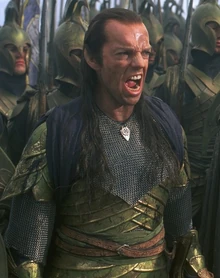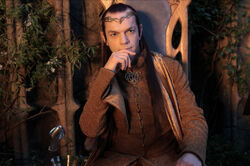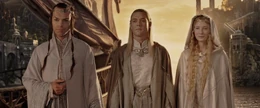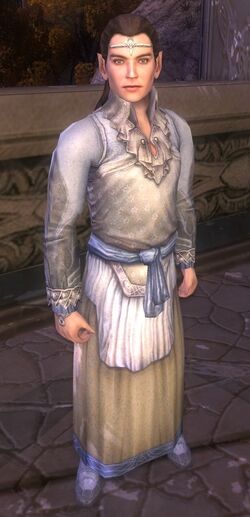- "The Ring! What shall we do with the Ring, the least of rings, the trifle that Sauron fancies? That is the doom that we must deem. That is the purpose for which you are called hither."
- —The Fellowship of the Ring, "The Council of Elrond"
Elrond Half-elven, Lord of Rivendell, was one of the mighty rulers of old who lived in Middle-earth from the First Age through the Third Age.
Biography
First Age
Elrond and his brother Elros with Maglor, by Jenny Dolfen
Elrond Half-elven is the son of Eärendil and Elwing, and a great-grandson of Lúthien. He was born in the refuge of the Havens of Sirion in Beleriand late in the First Age, soon before its sack by the Sons of Fëanor. Elrond and his twin brother Elros were captured and raised by Maedhros and Maglor, the Sons of Fëanor. Though at first there was no great love between them, eventually Maglor took pity on them and cherished them, and eventually grew to love them.[2] By the end of the First Age and the War of Wrath, the Sons of Fëanor were again working alone, suggesting that by this time Elrond and Elros had left their nominal captivity and traveled to Lindon.
Second Age
Elrond and Elros were given the choice at the end of the First Age to be counted among Men or Elves. Elros chose the Fate of Men and became Elros Tar-Minyatur, the first King of Númenor. Elrond chose to be counted among the Elves,[3] and remained in Lindon as captain and herald of Gil-Galad, the High King of the Ñoldor.[4]
In SA 1695, Elrond was sent to Eregion by Gil-galad in an attempt to protect the city from the invading forces of Sauron. Unfortunately, Elrond's host was too weak and was unable to hold off Sauron's army. He retreated north with a host of elves out of Eregion including Celeborn and remained ever watchful of Sauron from there. It was during the following two years (SA 1697) that Elrond founded Imladris at the feet of the Misty Mountains, which survived as one of the last remaining strongholds against Sauron at the end of the Third Age.[5][6]
After the combined forces of the elves under Gil-Galad, Cirdan, Elrond and the Men of Numenor defeated Sauron in SA 1701 Elrond remained in Imladris and hosted the first White Council, attended by Galadriel, at which it was decided that Elrond's home, the Last Homely House, would remain the last stronghold west of the Misty Mountains, and that the Three Rings then held by Gil-Galad and Galadriel would remain hidden. According to one account Gil-Galad at this time gave Elrond Vilya the Blue Ring, though in other accounts Gil-Galad kept both Narya and Vilya until the end of the Second Age. It was also here that Elrond first met Celebrían, the daughter of Celeborn and Galadriel.

Elrond in battle during the War of the Ring in the Second Age.
Near the end of the Second Age, Elrond rode beside Gil-Galad in the Last Alliance of Elves and Men, which set out from Rivendell to Mordor in SA 3431. Elrond was one of Gil-galad's most trusted commanders, and he led the Elves in destroying a whole legion of orcs with carefully aimed arrows in the Battle of Dagorlad. the Alliance was joined by the Dwarves led by Durin lV, eventually leading to the defeat of Sauron's forces. After a long siege of Barad-dûr Sauron himself was defeated when Isildur used Narsil to cut the One Ring from Sauron's finger, claiming the Ring for himself.
The Last Alliance of Elves and Men took a toll on the forces of both Elves and Men. Gil-Galad, Elendil, and his younger son Anarion were killed in the siege. Elrond and Cirdan only remained as the commanders of the elves, and Isildur as lord of men. Upon discovering that Isildur had claimed the One Ring for himself Elrond urged Isildur to throw the Ring into the fires of Mount Doom, but the seduction of the ring made Isildur refuse. Elrond said he would not force the Ring from Isildur, and left the problem to be dealt with by Men. Isildur was then named High King of Gondor and Arnor and took his father's throne, while Elrond returned to Rivendell at the end of the war.[5]
Third Age

Elrond in Rivendell.
In the year TA 109, Elrond wedded Celebrían. In the year TA 130, twins Elladan and Elrohir were born, and in TA 241 a daughter, Arwen Undómiel. Elrond lost Celebrían in TA 2510 when she was waylaid by orcs crossing the Misty Mountains and, unable to recover, took a ship to the Undying Lands.[7][8]
In the later years, he was instrumental in harboring the heirs of Isildur while the line lasted, the most famous of these sons of men was Aragorn son of Arathorn II, whom he took in and fostered as his own after his father died in TA 2933. Elrond, foreseeing the boy's difficult future gave him the name Estel, Sindarin for Hope. Aragorn grew up in Imladris unaware of his kingly lineage until Elrond told him when he had reached his manhood.[9]
He also was a member of the White Council, which was often held in Imladris and was a great friend of Gandalf the Grey. He helped Thorin Oakenshield's expedition to retake the Lonely Mountain (Erebor) by discovering and translating the Moon Writing on Thorin's map.[10]
Elrond had sent Glorfindel to search for the Ring-bearer.[11] On October 25, 3018 he held the Council at which it was decided to attempt to destroy the One Ring. He appeared to have selected the members of the Fellowship other than Frodo and Sam.[12]
Later, Elrond sent his sons Elladan and Elrohir with the Rangers of the North to Rohan. Through his sons, Elrond advised Aragorn to take the Paths of the Dead.[13]

Elrond departs Middle-earth
Elrond remained in Rivendell until the destruction of the One Ring and of Sauron, after which he went to Minas Tirith to surrender the Sceptre of Annúminas to King Elessar and give his daughter Arwen Undómiel away to be married.[14] On September 29, 3021, aged 6,520 years, Elrond left Middle-earth to go over the sea with the other Ring-bearers, never to return.[15]
Etymology
Elrond is a Sindarin name that means "Star-dome" or "Elf of the cave", from el ("Elf" or "star", interchangeably) and rond ("cave, vault").[16][17][18]
Character
Elrond was a skillful warrior in battle and had commanded various armies of the Free Peoples well, including the Last Alliance. He was just as effective at leadership and gave much wise counsel. He had the gift of foresight through which he could view lands and events far away from Rivendell. He was also adept at healing others, though whether through medical knowledge or magic isn't known. The latter may be more probable in that Elrond managed to cure a Morgul wound, something which is almost invariably fatal due its association with dark sorcery. While it is unknown just how powerful Elrond is compared to other Elf Lords, he certainly holds vast potential, being descended from the angelic Maia Melian. A notable demonstration includes Elrond summoning a great flood on the River Bruinen to sweep away the Nazgul.
Elrond was one of the most incorruptible of leaders of Middle-earth. Aragorn speculated that among the few capable of completely resisting Saruman's power of speech were Elrond, Galadriel, and Gandalf. Elrond also rejected and opposed Sauron when the latter offered partnership with the Elves.
Line of the Half-elves
| Finwë |
| Indis | ||||||||||||||||||||||||||||||||||||||||||||||||||||||||||||||||||||||||||||||||||||||||||||||||||||||||||||||||||||||||||
|
|
|
|
| |||||||||||||||||||||||||||||||||||||||||||||||||||||||||||||||||||||||||||||||||||||||||||||||||||||||||||||||||||||||||
|
|
| Fingolfin |
| Anairë |
| Galdor |
|
|
|
|
|
|
| Thingol |
| Melian | ||||||||||||||||||||||||||||||||||||||||||||||||||||||||||||||||||||||||||||||||||||||||||||||||||||||||||||
|
|
|
|
|
|
|
|
|
|
|
|
|
|
|
|
|
|
|
|
|
|
|
|
| |||||||||||||||||||||||||||||||||||||||||||||||||||||||||||||||||||||||||||||||||||||||||||||||||||||
| Elenwë |
| Turgon |
|
| Huor |
| Rían |
| Beren |
| Lúthien | |||||||||||||||||||||||||||||||||||||||||||||||||||||||||||||||||||||||||||||||||||||||||||||||||||||||||||||||||
|
|
|
|
|
|
|
|
|
|
|
|
|
|
|
|
|
|
|
|
|
| ||||||||||||||||||||||||||||||||||||||||||||||||||||||||||||||||||||||||||||||||||||||||||||||||||||||||
|
|
| Idril |
|
|
|
|
|
| Tuor |
|
|
|
|
|
|
| ||||||||||||||||||||||||||||||||||||||||||||||||||||||||||||||||||||||||||||||||||||||||||||||||||||||||||||
|
|
|
|
|
|
|
|
|
|
|
|
|
|
|
|
|
|
|
|
|
| ||||||||||||||||||||||||||||||||||||||||||||||||||||||||||||||||||||||||||||||||||||||||||||||||||||||||
|
|
|
|
|
|
|
|
|
|
|
|
|
|
|
|
|
|
|
| Dior |
| Nimloth | |||||||||||||||||||||||||||||||||||||||||||||||||||||||||||||||||||||||||||||||||||||||||||||||||||||||
|
|
|
|
|
|
|
|
|
|
|
|
|
|
|
|
|
|
|
|
|
|
|
| ||||||||||||||||||||||||||||||||||||||||||||||||||||||||||||||||||||||||||||||||||||||||||||||||||||||
|
|
|
|
|
|
|
|
|
|
|
|
|
|
|
|
|
|
|
|
|
|
|
|
|
| ||||||||||||||||||||||||||||||||||||||||||||||||||||||||||||||||||||||||||||||||||||||||||||||||||||
|
|
|
|
|
|
|
| Eärendil |
|
|
|
|
|
|
|
|
| Elwing |
| Eluréd and Elurín | |||||||||||||||||||||||||||||||||||||||||||||||||||||||||||||||||||||||||||||||||||||||||||||||||||||||||
The marriages between Elves and Men are in bold.
The Half-elves or the Peredhil are in italic.
Appearances in the Books and Films
In the books
- The Fellowship of the Ring
- The Return of the King
- The Hobbit
- The Silmarillion
- Unfinished Tales
- The History of Middle-earth
In the films
- The Fellowship of the Ring
- The Two Towers
- The Return of the King
- An Unexpected Journey
- The Battle of the Five Armies
Portrayal in adaptations
The Lord of the Rings trilogy

Elrond, as he appears in The Hobbit
In the movie trilogy by Peter Jackson, Elrond is played by Hugo Weaving.
- "I was there three thousand years ago, when the strength of Men failed."
- —Peter Jackson's The Fellowship of the Ring
Elrond's personality is completely different in the movies; he even goes as far as to try to convince Arwen to go to Valinor. (There is also no indication that she is not an only child.) He seems to be bitter towards men, including Aragorn, in spite of some of his ancestors' belonging to this race. This portrayal resembles Thingol, father of Lúthien.
This is remarkably different than the Elrond we see in the books. While Elrond was sorrowful at the loss of his daughter, he acknowledged Aragorn's love for his daughter and accepted her choice.
Like the rest of the Elves, Elrond was portrayed as somewhat aloof, even among his own kind, quite the opposite of the warm demeanor associated with Elves (especially those of Rivendell) in the books.
The Hobbit film trilogy
Elrond takes role in The Hobbit: An Unexpected Journey. He initially appears when the Elves of Rivendell ambushed the Warg-riders chasing Thorin and Company. Elrond wields Hadhafang (Arwen's sword in The Fellowship of the Ring) and is accompanied by Lindir.
Voice Dubbing actors
| Foreign Language | Voice dubbing artist |
|---|---|
| Spanish (Latin America) | Humberto Solórzano (The Lord of the Rings & The Hobbit) / Carlos Segundo (The Lord of the Rings re-dubbing) |
| Spanish (Spain) | Abel Folk |
| Portuguese (Brazil) (Television/DVD) | Luiz Laffey / Hélio Ribeiro (The Hobbit trilogy) |
| German | Wolfgang Condrus |
| Italian (Italy) | Luca Biagini |
| French (France) | Feodor Atkine |
| Polish | Adam Bauman (The Hobbit trilogy) |
| Czech | Vladislav Beneš |
| Slovak | Ivan Gogál |
Video Games

Elrond from The Lord of the Rings Online.
- In The Lord of the Rings Online, Elrond makes his first appearance in the game if the player selects to play an Elf. Elrond is with the player as the dwarves attack. He gives the character items that vary depending on the character's class. After this, he brings the player to another room where the player's master/teacher is waiting. After a brief tutorial battle between the player and the teacher Elrond tells the pair to go out to confront the enemy while he hides the relics sought by the dwarves.
Elrond next makes an appearance when the player's character returns to the shrine, just before it collapses on their former master. Elrond is outside and tries to comfort the player character, saying that "you can blame his death on me". He remarks on what they have just witnessed before the screen fades to black and the game advances in time by 600 years.
Thereafter, Elrond is a frequent quest-giver and an active participant in the epic story-line in the game.
- In The Lord of the Rings: Conquest, Elrond is a playable warrior in the instant action mod for Rivendell and the Hero Arena at the Black Gate. He has a long elvish blade and an elvish throwing axe, similar to the other elven warriors. Tsunami Blade, River of Bruinen, and Water Sphere are his special abilities. He is the narrator for both campaigns. In the evil campaign, Elrond is seen during the Rivendell mission. He can be killed by Uruk-hai, or by Sauron himself. It is said that Elrond is a king, and the player must obtain his ring of power after his death. However, at the end, he returns and must be killed again, together with Legolas.
- In The Battle for Middle-Earth II, Elrond is a hero of the Elf faction. His powers include two healing spells: Athelas, which heals himself and all nearby heroes, and a magical spell which restores heroes' health and abilities. His most powerful spell is a whirlwind (possibly an allusion to Elrond's ring of air), which can be used to sweep the map and instantly wreak havoc upon attacking units. He is the narrator for both of the campaigns, as he does in Conquest. In the Good Campaign, Elrond is playable in the first mission, where the player must defend Rivendell. He is also playable during the last mission, when the player must destroy the fortress of Dol Guldur. In the Evil Campaign, he must be killed during the last mission at Rivendell.
| This page uses content from Wikipedia. The original article was at Elrond. The list of authors can be seen in the page history. As with The One Wiki to Rule Them All, the text of Wikipedia is available under the Commons Attribution-Share Alike license. |
| People: Faramir · Sauron · Witch-king of Angmar · Gollum · Elrond · Frodo Baggins · Samwise Gamgee · Meriadoc Brandybuck · Peregrin Took · Gandalf · Aragorn II · Legolas · Gimli · Boromir · Galadriel · Elves · Hobbits Locations: Middle-earth · Gondor · Mordor · Rohan Other: Mithril · Middle-earth Strategy Battle Game · The Fellowship of the Ring: Being the First Part of The Lord of the Rings · Works inspired by J. R. R. Tolkien · The Lord of the Rings · The Lord of the Rings (1978 film) · Ainulindalë · Tolkien vs. Jackson · Tengwar · Quenya |
References
- ↑ The History of Middle-earth, Vol. 11: The War of the Jewels, V. The Tale of Years
- ↑ The Silmarillion, Quenta Silmarillion, Chapter XXIV: "Of the Voyage of Eärendil and the War of Wrath"
- ↑ The Silmarillion, Akallabêth (The Downfall of Númenor)
- ↑ Unfinished Tales, Introduction, Part Two, IV: "The History of Galadriel and Celeborn"
- ↑ 5.0 5.1 The Silmarillion, Of the Rings of Power and the Third Age
- ↑ The Lord of the Rings, Appendix B: The Tale of Years (Chronology of the Westlands), "The Second Age"
- ↑ The Lord of the Rings, Appendix A: Annals of the Kings and Rulers, I: The Númenórean Kings, (iii): "Eriador, Arnor, and the Heirs of Isildur"
- ↑ The Lord of the Rings, Appendix B: The Tale of Years (Chronology of the Westlands), "The Third Age"
- ↑ The Lord of the Rings, Appendix A: Annals of the Kings and Rulers, I: The Númenórean Kings, (v): "The tale of Aragorn and Arwen"
- ↑ The Hobbit, Chapter III: "A Short Rest"
- ↑ The Lord of the Rings, The Fellowship of the Ring, Book One, Chapter XII: "Flight to the Ford"
- ↑ The Lord of the Rings, The Fellowship of the Ring, Book Two, Chapter II: "The Council of Elrond"
- ↑ The Lord of the Rings, The Return of the King, Book Five, Chapter II: "The Passing of the Gray Company"
- ↑ The Lord of the Rings, The Return of the King, Book Six, Chapter V: "The Steward and the King"
- ↑ The Lord of the Rings, The Return of the King, Book Six, Chapter IX: "The Grey Havens"
- ↑ The Silmarillion, Index of Names
- ↑ The Silmarillion, Appendix: Elements in Quenya and Sindarin names
- ↑ The History of Middle-earth, Vol. 12: The Peoples of Middle-earth, XII: "The Problem of Ros"
